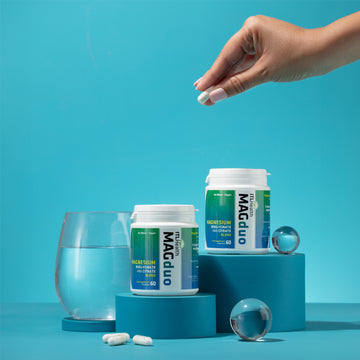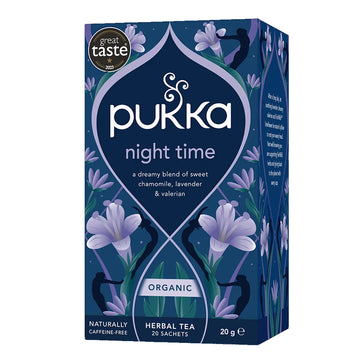There's nothing nicer than waking up from a deep sleep, feeling fully rested and ready for the day. But getting there isn't as easy as we'd hope. When we think of what constitutes a ‘good sleep’, we tend to think more of how many hours we get, rather than the actual experience of the sleep itself or sleep quality. So what makes up a good night's sleep? What's the dream scenario (pardon the pun!)? Let’s look at some of the factors that can make or break patterns of rest, plus how to sleep better.
What Makes for a Good Night's Sleep?
Ideally, we'd be drifting to sleep within 30 minutes of hitting the pillow, waking up no more than once a night, and if you do wake up, falling back asleep within a 20 minute window.
Of course, the total time spent asleep is still a factor, but regardless, if your 8 hours of rest are broken and aren't in the correct rhythm, this is not quality sleep. So what factors can make or break a good sleep pattern? Everything from our biological clock to blue light.
The Biological Clock
Biological clocks are organisms’ natural timing devices – they regulate the cycle of circadian rhythms. Circadian rhythms are 24-hour cycles that are part of the body’s internal clock (the sleep-wake cycle being one of them). These natural processes respond primarily to light and dark for example, circadian rhythm prompts plants to open their leaves in daylight and to close them at night.
All the biological clocks in a living thing are coordinated by a master clock in the brain, keeping the clocks in sync. The master clock is a group of nerve cells that form a structure called the suprachiasmatic nucleus, or SCN for short. The SCN is located in the brain and uses none other than sunlight to synchronise all of our cellular clocks with the Earth’s rotation.
So, in essence, the light from the sun speaks to the SCN. This relays this information to every cell in our body, which then work as a whole to create our circadian rhythm.
Any upset to the circadian rhythm could influence and affect our hormone release, eating habits and digestion, body temperature, and lots of other important bodily functions, and crucially the sleep-wake cycle. Things like working night shifts, jet lag or even blue lights from screens can cause our circadian rhythms and the natural light-dark cycle to be out of sync.
The Blue Light
We know from a hormonal point of view, our sleep-wake cycle is a delicate dance of cortisol and melatonin. When we're in the dark, melatonin is produced. And on the other hand, we're in 'stay-awake' mode when melatonin production is stopped. This happens when sunlight is registered by special light-detecting cells in the back of the eye called ipRGCs.
The lightbulb has only been around for 140 years – very little time in the grand scheme of things. And even more recently is the LED screen in the form of our phones and laptops. Whether you're working on your laptop or scrolling away on your phone, we're surrounded by a serious amount of LED screens daily. These emit a large amount of blue light, and blue light is the colour that the ipRGCs are best at detecting.
If you use your phone or any other screen in bed or in the hours leading up to bedtime, even if it's just to wind down with a TV show, it's affecting your melatonin production. Yes, the levels of a hormone which is needed for you to sleep well and that work against your circadian rhythm.
Sleep Stages & Rest
Sleep occurs in 4 stages – one is REM sleep and three of these are non-REM sleep. You cycle through these several times throughout the night, but the stage we tend to hear the most about is REM sleep. It kicks in about 90 minutes after we fall asleep, and most of our dreaming occurs during this stage.
During REM, our brain releases powerful chemicals that actually paralyze our bodies, aside from our eyes. Our amygdala is also active, a part of our brain that processes emotions. However, our actual physicality and brainwave activity is near to that of waking levels – so this is not restful sleep.
Stage 3 of non-REM sleep is what's needed for us to wake up feeling refreshed. During this stage, our brain produces the slow delta waves that are associated with healing and rejuvenation. It's during the deepest part of stage 3 that you are most difficult to wake, and the body begins repairing muscles and tissue, stimulates growth, maintains immune wellbeing and restores energy.
Prioritise Sleep
We often underestimate how important sleep is. Quality sleep (and enough of it) is as essential to survival as food and water. Yet when it comes to feeling well, we're often quicker to look at our diets or day-to-day routines to see what we can improve. It's as important to look at our sleep schedules and see where we're coming up short as well as ways to sleep better.
How to Sleep Better
Wondering how to sleep better? Here are some practical things you can do to ensure you're getting a good night's sleep.
1. Set a schedule - try to got to sleep and get up at the same times.
2. Avoid caffeine, particularly after midday, as well as nicotine and alcohol – the secret sleep thieves!
3. Expose yourself to lots of daylight during the day.
4. Create a bedtime routine, one that's relaxing and helps you to wind down.
5. Opt for dim red lights when it comes to night lights.
6. Avoid screens for 2-3 hours before bed (yes, really!).
7. If you are using screens, consider investing in blue-light blocking glasses.
8. If your sleep is still subpar, it could be worth approaching your healthcare professional or considering a sleep aid supplement.
Looking for some natural ways to nod off? Read about natural sleep aids for a better night's sleep.
Please note, this blog is for informational purposes only and should not replace medical advice.
It’s always best to consult your doctor before taking any new supplements, treatments or remedies if you are pregnant, breastfeeding or on medication.
Checked and updated: 11 August 2021
























